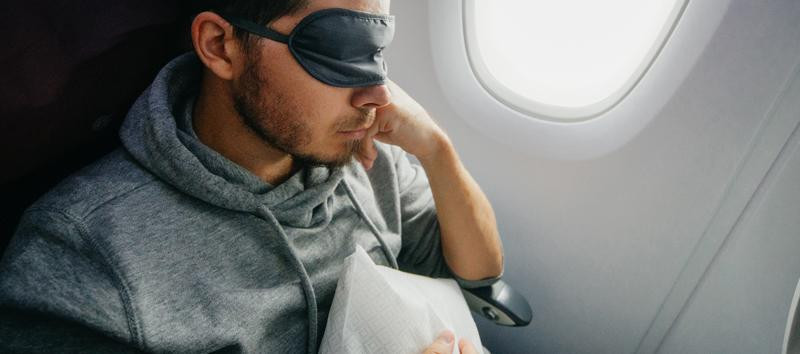Can you fly with a concussion? Yes, it’s generally safe, but air travel can worsen concussion symptoms due to overstimulation and stress. At flyermedia.net, we understand the challenges of flying with a head injury, and we’re here to provide advice on minimizing discomfort and ensuring a safe journey. By taking precautions before, during, and after your flight, you can manage these symptoms effectively and enjoy your travel experience, find flight training, and explore career advancement. Learn about aviation regulations, flight technology, and travel tips, all while considering factors like air travel stressors and symptom management.
1. Is It Safe to Fly After a Concussion?
Generally, flying after a concussion is safe, but it’s important to consider potential challenges. Air travel involves extreme visual and auditory stimulation, time-sensitive decision-making, and potential stress and confusion. These factors can overstimulate individuals with concussions, making it harder to function normally. It’s crucial to assess the injury’s recency and severity, as well as whether you’re experiencing post-concussion syndrome.
1.1. What If You Suffered a Concussion Recently?
With very few exceptions, it’s generally safe to fly with a concussion. If you’ve recently suffered a concussion and need to travel, it’s crucial to take precautions. People may experience accidents on vacation, athletes travel for competitions, or car accidents occur on business trips, making air travel necessary despite the injury. Ensure you prioritize rest, hydration, and minimize exposure to stressors during the flight.
1.1.1. What Do the Studies Show?
Research offers mixed insights on flying shortly after a concussion. According to research from the journal Neurology, a small study of collegiate athletes and military cadets who flew within hours after an injury found that neither the severity of their symptoms nor the recovery time was affected by the flight when compared to those who did not fly immediately after a concussion. However, a study of NHL players in the British Journal of Sports Medicine found a slightly longer recovery time for those who flew within 6 hours after a concussion.
1.1.2. Speaking of Brain Rest: How Much Sleep Have You Had?
 A man resting on the plane with an eye mask covering his eyes
A man resting on the plane with an eye mask covering his eyes
Quality sleep is crucial for concussion recovery, as the brain flushes out toxins during restorative sleep. According to research from the journal Neurology, better sleep quality is tied to better brain function after brain injury. Aim for a consistent sleep schedule and create a relaxing bedtime routine to promote optimal rest.
1.1.3. What If You Just Had a Concussion… But You Feel Fine?
Delayed onset of symptoms can occur even if you feel fine after a concussion. According to research from the University of Pittsburgh Medical Center, symptoms can emerge days or weeks after the initial injury. Stressful flight conditions may exacerbate minimal symptoms, so be prepared for potential challenges.
1.2. Is It Safe to Fly with Post-Concussion Syndrome?
Yes, it is safe to fly with post-concussion syndrome, but it will probably make your symptoms worse temporarily. Post-concussion syndrome (PCS) occurs when the brain doesn’t return to its normal, efficient functioning after a concussion. If you’re experiencing symptoms weeks after a concussion, you might have PCS. Though safe, flying might worsen symptoms temporarily. Taking measures to minimize symptom severity and duration is advisable.
1.3. Are There Times You Shouldn’t Fly with a Concussion?
Flying is not advisable without a physician’s consent if you’ve had a severe traumatic brain injury (TBI). For example, follow your doctor’s advice if your injury involved a skull fracture or significant bleeding. Additionally, avoid flying when sick, regardless of a concussion, to protect yourself and fellow passengers from infection.
2. Which Concussion Symptoms Can Worsen When Flying with a Concussion?
Many concussion symptoms can worsen during air travel due to environmental stressors. Common symptoms aggravated by flying include:
- Headaches: Overstimulation, noise, fluorescent lighting, and light changes can intensify headaches.
- Anxiety: Stressful environments, noise, and movement can exacerbate anxiety and panic attacks.
- Pain and Tension: Persistent neck and shoulder pain can be aggravated by uncomfortable seating and prolonged immobility.
- Extreme Fatigue: The brain’s struggle to cope with extra demands can lead to fatigue. Inadequate sleep and time zone changes can also induce fatigue.
- Nausea and Vertigo: Vestibular system dysfunction can cause nausea and vertigo. Navigating crowds, escalators, altitude changes, and turbulence can trigger these symptoms.
- Feeling Overwhelmed: Decision-making challenges can arise due to the brain’s reduced capacity to handle stress. Getting through security, navigating the airport, and dealing with delays can become difficult.
3. What Can You Do to Minimize Concussion Symptoms While Flying?
Benjamin Franklin wisely said, “An ounce of prevention is worth a pound of cure.” Whether you have a recent concussion or post-concussion syndrome, preventative measures can significantly minimize symptoms when flying. Implementing strategies before, during, and after the flight can ease discomfort and promote a safer journey.
3.1. Plan Before You Fly
Planning ahead is crucial for minimizing concussion symptoms when traveling, particularly by air. Make as many decisions as possible in advance to ensure smoother execution of your travel plan.
- Enlist a travel companion to provide support and keep you on track. This person can assist if you start feeling overwhelmed.
- Explore resources offered by airports and airlines for travelers with disabilities. According to the U.S. Department of Transportation, you can arrange assistance with baggage, security, and gate navigation. Early boarding may also be available to reduce stress and confusion.
- Purchase a seat in Business Class or First Class if your budget allows. These seats offer more comfort, space, and quieter surroundings.
- Create a comprehensive packing list and check items off as you pack to stay organized.
- Develop a detailed schedule of activities upon arrival to minimize stress and promote relaxation.
- Plan your meals in advance, including when, where, and what you will eat, to ensure healthy nutrition.
- Carefully consider transportation options at your destination, opting for alternatives to driving if possible to avoid added stress.
- Schedule rest time after arrival to recover from fatigue and address any symptom flare-ups before continuing.
3.1.1. If You’re Changing Time Zones
When your flight involves changing time zones, it’s essential to plan for the effects of jet lag on your sleep and medication schedule.
Sleep
Adjusting your sleep schedule gradually before the flight can help you acclimate to the new time zone. According to SleepFoundation.org, changing your sleep and wake times by 30-minute increments can ease the transition. Consult your doctor before taking any sleep medications during your trip.
Medication
 A photo of a pill organizer box
A photo of a pill organizer box
Plan your medication schedule in advance. If you take medications at specific times, adjust those times gradually to avoid significant dosage changes. Set alarms to ensure you don’t miss doses as you adjust to the new time zone. Use a pill organizer box to avoid confusion and ensure you take your medications correctly. Be aware of any medication side effects, such as drowsiness or alertness, as they could interfere with your sleep schedule.
3.2. How to Minimize Concussion Symptoms During the Flight
The following suggestions can help minimize concussion symptoms during the flight. These strategies are beneficial for all travelers but are particularly important for those with concussions:
- Stay properly hydrated and maintain good nutrition. Pack healthy snacks and drink plenty of water during the flight.
- Avoid alcohol and caffeine before and during the flight.
- Use high-quality earplugs or noise-canceling headphones if you suffer from noise sensitivity. Listen to calming nature sounds or Brainwaves to promote relaxation.
- Wear sunglasses or an eye mask during the flight if you have light sensitivity.
- Practice mindful breathing and meditation if you start feeling anxious. Focus on diaphragmatic breathing to stay calm.
- Take measures to prevent illness, such as washing your hands often and wearing a mask if needed.
- Anticipate situations that may trigger symptoms, such as navigating the aisle to the bathroom.
- Avoid rushing to exit the plane, especially if you are traveling alone. If you requested airline assistance, someone will be waiting for you at the door.
3.3. At Your Destination
Once you’ve arrived at your destination, rely on your pre-flight planning. Take time to rest and stabilize before engaging in activities. Maintain a healthy diet and prioritize adequate sleep. Don’t hesitate to ask for assistance when needed, and remember to be patient with yourself, as travel can be stressful for the brain.
4. Understanding Concussions and Their Impact on Air Travel
A concussion is a type of traumatic brain injury (TBI) that occurs when a blow to the head or violent shaking causes the brain to bounce around or twist within the skull. This can lead to temporary neurological dysfunction, affecting cognitive, physical, and emotional functions.
- Cognitive Symptoms: Difficulties with memory, concentration, and decision-making.
- Physical Symptoms: Headaches, dizziness, nausea, blurred vision, and sensitivity to light and noise.
- Emotional Symptoms: Irritability, anxiety, depression, and mood swings.
4.1. The Unique Challenges of Air Travel for Concussion Sufferers
Air travel presents several unique challenges for individuals recovering from a concussion:
- Cabin Pressure Changes: Fluctuations in cabin pressure can exacerbate headaches and dizziness.
- Environmental Factors: Bright lights, loud noises, and crowded spaces can overstimulate the brain.
- Stress and Anxiety: The stress of travel, including navigating airports and dealing with potential delays, can worsen symptoms.
- Dehydration: Low humidity levels in airplanes can lead to dehydration, which can worsen headaches and fatigue.
4.2. Resources for Concussion Education and Support
Understanding concussions is crucial for managing symptoms and promoting recovery. Reliable sources of information include:
- Centers for Disease Control and Prevention (CDC): Provides comprehensive information on concussion symptoms, treatment, and prevention.
- National Institute of Neurological Disorders and Stroke (NINDS): Offers research-based information on TBI and concussion.
- Brain Injury Association of America (BIAA): Provides support, resources, and advocacy for individuals with brain injuries and their families.
- Flyermedia.net: Offers articles and resources related to flying safely with concussions and managing related health concerns.
5. Practical Tips for a Comfortable and Safe Flight
Beyond the general recommendations, consider these practical tips for a more comfortable and safe flight:
- Medical Consultation: Consult with your doctor before flying, especially if you recently had a concussion or have persistent symptoms.
- Travel Insurance: Consider purchasing travel insurance that covers medical expenses and trip cancellations due to concussion-related issues.
- Medication Management: Keep all necessary medications easily accessible in your carry-on luggage.
- Communication: Inform flight attendants and airport staff about your condition so they can provide assistance if needed.
- Seating Arrangements: Choose a seat near the aisle for easier access to the restroom or to stretch your legs.
- In-Flight Activities: Engage in calming activities such as reading, listening to soothing music, or practicing relaxation techniques.
- Hydration: Drink plenty of water and avoid sugary drinks or excessive caffeine.
- Rest and Breaks: Take frequent breaks to stretch, walk around, and avoid prolonged sitting.
- Symptom Monitoring: Be aware of your symptoms and take appropriate measures if they worsen, such as using relaxation techniques or taking medication as prescribed.
6. Success Stories: Real-Life Experiences of Flying with a Concussion
Hearing about others who have successfully navigated air travel with a concussion can be inspiring and provide valuable insights.
6.1. Patient Testimonials
- Sarah’s Story: “I was worried about flying after my concussion, but with careful planning and support from my family, I had a smooth journey. The key was to stay hydrated, avoid stress, and take breaks when needed.”
- Mark’s Experience: “Noise-canceling headphones were a lifesaver during my flight. They helped me block out the noise and stay calm. I also made sure to inform the flight attendants about my concussion, and they were very accommodating.”
- Emily’s Journey: “Planning my medication schedule and adjusting my sleep times before the flight made a huge difference. I arrived at my destination feeling much better than I expected.”
6.2. Expert Insights from Aviation Professionals
- Dr. Aviation Expert: “Flying with a concussion requires awareness and preparation. Encourage your patients to consult with their healthcare provider and follow practical tips to minimize symptoms.”
- Flight Attendant: “We are trained to assist passengers with various medical conditions. If you have a concussion, please let us know so we can provide the necessary support.”
7. The Role of Technology in Enhancing the Travel Experience for Concussion Sufferers
Technology plays a significant role in improving the travel experience for individuals with concussions.
7.1. Assistive Technologies
- Noise-Canceling Headphones: Reduce environmental noise and promote relaxation.
- Blue Light Filters: Minimize eye strain and headaches caused by electronic devices.
- Sleep Apps: Provide guided meditations and relaxation techniques to improve sleep quality.
7.2. Mobile Apps and Tools
- Concussion Management Apps: Track symptoms, manage medications, and provide educational resources.
- Travel Planning Apps: Help organize itineraries, book flights and accommodations, and provide real-time updates.
- Meditation and Mindfulness Apps: Offer guided meditation sessions to reduce stress and anxiety.
8. Staying Informed: Latest Research and Guidelines
Staying updated on the latest research and guidelines is essential for managing concussions effectively.
8.1. Current Research Trends
- Neuroimaging Studies: Investigating the effects of concussions on brain function and recovery.
- Treatment Protocols: Developing and refining evidence-based treatment approaches for concussion management.
- Return-to-Activity Guidelines: Establishing safe and gradual return-to-activity protocols for athletes and individuals with concussions.
8.2. Resources for Staying Updated
- Medical Journals: Regularly review publications such as the Journal of Neurotrauma and Brain Injury.
- Medical Conferences: Attend conferences and seminars to learn about the latest research and best practices.
- Online Resources: Subscribe to newsletters and follow reputable organizations for updates on concussion management.
9. Addressing Common Concerns and Misconceptions
Clearing up common concerns and misconceptions about flying with a concussion can provide reassurance and promote informed decision-making.
9.1. Addressing Common Myths
- Myth: Flying with a concussion always worsens symptoms.
- Fact: With proper planning and precautions, symptoms can be minimized.
- Myth: You should never fly shortly after a concussion.
- Fact: Flying is generally safe if cleared by a healthcare provider and appropriate measures are taken.
9.2. Expert Advice on Addressing Concerns
- Neurologist: “It’s important to address any concerns with your doctor and develop a personalized plan for flying with a concussion.”
- Physical Therapist: “Physical therapy can help manage symptoms such as dizziness and balance issues before and after flying.”
10. Final Thoughts: Empowering You to Fly Safely with a Concussion
Navigating air travel with a concussion requires careful planning, awareness, and proactive management. By understanding the potential challenges, implementing practical tips, and staying informed, you can minimize symptoms and enjoy a safe and comfortable flight. Remember to consult with your healthcare provider, utilize available resources, and prioritize your well-being throughout your journey.
Concussions and flying safely can coexist with the right preparation. Flying with concussion symptoms is more challenging but manageable with planning. Don’t let a concussion prevent you from traveling.
Ready to take to the skies? Visit flyermedia.net to explore flight training programs, stay updated with aviation news, and discover exciting career opportunities in the aviation industry. Your journey towards a fulfilling aviation experience starts here! Contact us at Address: 600 S Clyde Morris Blvd, Daytona Beach, FL 32114, United States. Phone: +1 (386) 226-6000. Website: flyermedia.net.
FAQ: Flying with a Concussion
1. Is it safe to fly immediately after a concussion?
Yes, with few exceptions, it’s generally safe, but consult your doctor and take precautions.
2. How can I minimize headaches when flying with a concussion?
Use noise-canceling headphones, wear sunglasses, and stay hydrated to reduce overstimulation.
3. Will cabin pressure worsen my concussion symptoms?
Cabin pressure changes can exacerbate headaches and dizziness; stay hydrated and rest.
4. What if I feel anxious during the flight?
Practice deep breathing exercises and use relaxation techniques to manage anxiety.
5. Should I inform the airline about my concussion?
Yes, informing the airline can ensure you receive necessary assistance and accommodations.
6. Can I take medication during the flight for my concussion symptoms?
Consult your doctor about appropriate medications and their timing.
7. How important is sleep after flying with a concussion?
Quality sleep is essential for recovery; prioritize rest and maintain a regular sleep schedule.
8. Are there any resources for understanding and managing concussions?
Yes, organizations like the CDC, NINDS, and BIAA offer valuable information and support.
9. What should I do if my symptoms worsen during the flight?
Use relaxation techniques, take medication if prescribed, and seek assistance from flight attendants.
10. Can technology help manage my symptoms during travel?
Yes, noise-canceling headphones, blue light filters, and meditation apps can enhance comfort.
